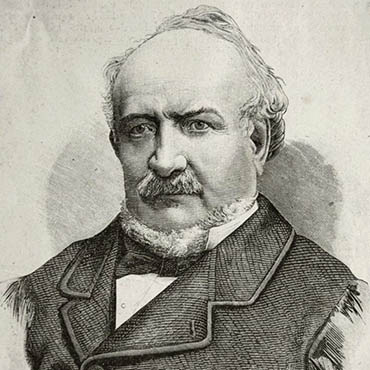Berti was born in 1820 at Cumiana near Turin and studied at the college in Carmagnola, where his teachers included the Rosminian priest, Giovanni Antonio Rayneri. He subsequently attended the University of Turin, where he came into contact with moderate Neo-Guelph circles, like the salon of Luigi Ornato. After his degree in philosophy and philology he became interested in pedagogical methods in primary education. In 1846 he received a diploma from the Scuola superiore di metodo normale, founded by Ferrante Aporti during the reign of Carlo Alberto of Savoia. The following year, after a short stint as a schoolteacher, he became a lecturer in the methodology applied to primary education at the University of Turin, with the task of developing guides that were to lay the groundwork for the creation of a national awareness.
He was politically active, firstly with the democrats of Lorenzo Valerio, then with the moderate Catholics and finally with the moderate liberals, and contributed to several periodicals of varied political persuasions. After he obtained the chair of moral philosophy in 1849, he started an ambitious study project on the history of Italian thought with documentary work on Giordano Bruno and Pico della Mirandola. He did not neglect the field of state education, which remained the focus of his interests and led to the opening in Turin of the People’s methodical bookshop for free education, sponsored by Cesare Alfieri, Terenzio Mamiani and Pasquale Stanislao Mancini, as well as a number of institutes for the dissemination of Italian national culture.
In 1850 he was elected to Parliament. However, because he did not share the educational policies of the second Cavour government, which, in his view, were damaging the educational freedom of private schools, he distanced himself from the right wing. He stood for election to the 6th Legislature as part of a new political group but lost and only returned to Parliament in 1860. The numerous posts that he was assigned by both the Council of State and the Ministry of Agriculture, Industry and Commerce, forced him to give up his chair at the University of Turin. After he was nominated Minister of Education in 1865, he wholeheartedly supported the battle against illiteracy and the establishment of libraries for teachers.
At the end of his appointment he dedicated himself to research and published the Vita di Giordano Bruno (1868), which was the first of a series of works on Bruno and Campanella, but, above all, on the manuscript sources of the history of Copernicanism in Italy and on the related events about the Inquisition. The most important volumes are his Copernico e le vicende del sistema copernicano in Italia nella seconda metà del sec. XVI e nella prima del XVII, con documenti inediti intorno a G. Bruno e G. Galilei (1876), which was born out of a cycle of lectures assigned to him on the occasion of the 400th anniversary of the birth of Copernicus, and Il processo originale di Galileo Galilei (1878). Politically he moved more and more towards the left and was Minister of Agriculture, Industry and Commerce in the fourth and fifth governments of Depretis. However, his plan, which he set out in some of his writings with the aim, albeit tentative, of laying the foundations to guarantee regulations and protection for the world of work, did not receive support, for opposing reasons, either from the right or from the workers’ movement, and collapsed, forcing him to give up his post. He became less and less involved in politics, perhaps because of the weakening of those Risorgimental urges that as a subject of study he kept alive throughout his life. He held a number of honorary posts and sat in Parliament until his death in Rome in 1897.
Berti’s acquaintance with Antonio Favaro started early and dated from a favourable review of Copernico e le vicende del sistema copernicano in Italia, which Favaro, at the time a young lecturer, published in the Leipzig “Zeitschrift für Mathematik und Physik” of Leipzig and which he always considered to be his first writing on the subject of Galileo. Berti, who was almost fanatical for documented reconstructions to which he devoted himself passionately and well beyond the spirit of the time, was convinced that the Catholic renewal that he longed for and which made him a strong supporter of the Law of Guarantees, should acknowledge the capital error made by the Church against Galileo.
Berti was one of the first to convince Antonio Favaro to focus on studies of Galileo: “at a time when I was still wavering between various areas of the history of science”, as Favaro admitted in reporting to La Crusca on the publication of the last volume of the National Edition, “Berti supported me in focusing on the loftiest subject of all my studies”. Nevertheless, apart from the celebratory speeches on prominent personalities, Berti subsequently was almost an obstacle to the launching of the work, as he took “a very dim view” of someone else undertaking a task that he himself had hoped to undertake, but in which he was not involved. When in February 1887 the publication of the decree that was to officially launch the project was once again delayed, using as a pretext the recent defeat at Dogali [in Ethiopia], Favaro, writing to Isidoro Del Lungo, stated that the delay, rather than being caused by “Ras Alula of Abyssinia”, bore “the pawprints of another Ras”, rather closer to them, whose name there was no need to specify.


